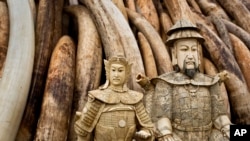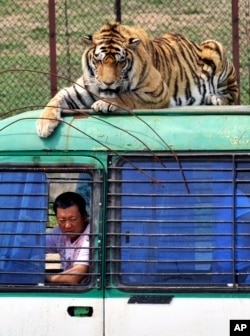Chinese officials say the country will permit trading of products made from endangered tigers and rhinos in “special” cases.
The decision ended a ban that had been in effect since 1993. No reason was given for lifting the ban.
A government statement issued on Monday did not note any change to existing law. Instead, the statement said the government would “control” the trade.
The new rules permit the sale of rhino horns and tiger bones from farmed animals. The animal parts may be sold only if the products are for medical research or treatment. Tiger bone and rhino horn are used in traditional Chinese medicine. There is a lack of evidence, however, that they are effective in treating disease.
The statement said the central government “urged governments at all levels to improve publicity activities for protecting rhinos and tigers to help the public actively boycott any illegal purchases.”
Wildlife conservation groups have condemned the decision. The U.S.-based World Wildlife Fund said the move would lead to “devastating” results around the world. It said illegal hunters would be able to hide behind the legalized trade.
Margaret Kinnaird is with the World Wildlife Fund. She said in a statement, “With wild tiger and rhino populations at such low levels and facing numerous threats, legalized trade in their parts is simply too great a gamble for China to take.”
She added that the decision appeared to go against, in her words, “the leadership China has shown recently in tackling the illegal wildlife trade.”
China banned the sale of ivory from elephant tusks earlier this year, a move that conservationists praised. Britain’s Environmental Investigation Agency said the move hurts “international efforts for tiger and rhino conservation.”
The group added that China has destroyed its “reputation as a growing leader in conservation.”
Foreign Ministry spokesman Lu Kang said China’s position on protecting endangered animals is unchanged. He said the changes are aimed at making earlier rules clearer and increasing enforcement.
There are fewer than 4,000 wild tigers left in the world, according to 2016 reports. Studies estimate the population of wild rhinos to be less than 30,000.
I’m Ashley Thompson.
The Associated Press reported this story. Ashley Thompson adapted it for Learning English. Mario Ritter was the editor.
_______________________________________________________________
Words in This Story
endangered –adj. describes a kind of animal or plant that has become very rare that could die out completely
gamble –n. something that could produce a desired result or a bad result
tackle –v. to deal with something
conservation –n. the protection of animals, plants and natural resources
reputation –n. the common opinion that people have about someone or something






